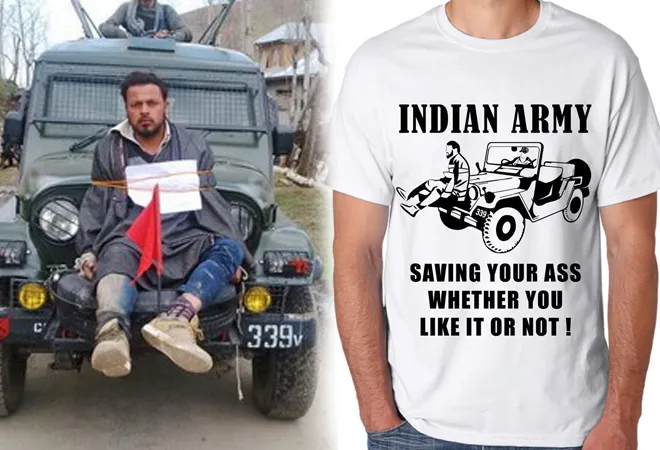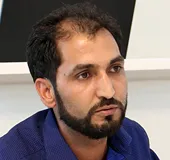
In Kashmir, the BJP appears to be gradually walking into the trap laid by Pakistan’s Inter-Services Intelligence (ISI). Many of the tactics being used by the party and its hardline associates are becoming tools for Pakistan-based state and non-state actors to foment further radicalisation of the Kashmiri youth and lend more credence to the intentions of the separatists. Their efforts to create a sense of cheap nationalism – by painting all Kashmiri youth as terrorists who need to be taught a lesson – are bound to harm India’s national interests and cause further alienation of the local population from the rest of India.
A case in point is the recent online sale of T-shirts depicting a caricature of the Army’s controversial “human shield” episode in April last year by a Delhi BJP leader who is also the self-proclaimed chief of Delhi-based ultra-right wing Bhagat Singh Kranti Sena. These T-shirts, touting the messages of pseudo nationalism, will undoubtedly harm the reputation of the Indian Army, which, since 1998, has been trying hard to win the trust of the local population by undertaking several humanitarian efforts through Operation Sadbhavna. Worse, these T-shirts and the terrifying image of the Army they are seeking to portray, is a perfect recipe of what the ISI would have desired.
Drawing an outrageous parallel with Farooq Dar, a shawl weaver, who was tied to an army jeep as a “human shield” to prevent stone pelting on the Army convoy, the T-shirts instigate buyers to wear nationalism on their chests. Being lapped up by pseudo nationalists across the country, the T-shirts carry the slogan: “Indian Army: Saving your ass whether you like it or not!” Clearly, it leaves nothing to imagination in terms of what these T-shirts are referring to and whom they are targeted against.
Irrespective of the reason behind the act of using Dar, who was returning after casting his vote in the Lok Sabha by-election on 9 April 2018, as “human shield” by the Army, that episode made international news. As the video of this episode went viral, an Army Court of Inquiry (CoI) was set up to probe the incident. The J&K police registered an FIR against the Army officer who had ordered that action. But even before the CoI inquiry had been completed, the Army awarded the officer with a commendation medal for his “sustained efforts during counter-insurgency operations”. He was also showered praise by the Army Chief General Bipin Rawat and the then Defence Minister Arun Jaitley.
Now, after nearly an year, thanks to the sale of these outrageous T-shirts by the BJP Delhi spokesperson, the episode has once again attracted international media glare.
And as expected, the first ones to abuse them to fuel anti-India propaganda are the newspapers in Pakistan. An article, titled “Indian clothing brand launches apparel mocking IoK residents,” in The Express Tribune clearly shows how this leader, in his zeal to commercially exploit the largely misplaced perception of the Kashmiri youth among rest of Indians, has ended up playing into the hands of those very forces that the Indian government and Army are trying to resist. The report concludes: “It (the t-shirts) shows how Indians hate Kashmiris and would not even spare an innocent who was first humiliated by being used as a human shield by the Indian army and now after passing a year the same man’s image was printed on shirts to disgrace him across the globe”. Another report in the Al Jazeera claimed that these T-shirts will not only escalate the tension in the valley but further outrage the Kashmiris who have termed it “selling the pain”.
At a time when, despite its hard-line approach, the Indian Army is determined to engage with the people of Kashmir in a humane manner, such anti-India publicity is not only counter-productive, but also blunts transformative endeavours such as Operation Sadbhavna.
In 1998, the Army implemented its Operation Sadbhavna, a comprehensive image makeover exercise, to improve its perception among the people in the Kashmir Valley and to bridge the growing divide between “Jawan and Awam”, under the slogan “Jawan aur Awaam, Aman hai Muqam” (Soldier and People together can bring peace). The objective of this plan is to reach out to the people of Jammu and Kashmir reeling under the shadow of Pak-sponsored terrorism.
Operation Sadbhavna continues to execute a large number of broad-based initiatives for the improvement of the Valley’s social indices, exposure of its youth to the rest of India, infrastructure creation such as schools, bridges etc. The youth from Kashmir, especially school and college students, are sent on national integration tours to other parts of the country to create a sense of “Indianness” and integrate them with the larger socio-cultural contexts of India.
The Army, under Operation Sadbhavna, also runs many skill development programmes in Kashmir and provides basic healthcare through free medical camps in rural areas of the Valley through this initiative.
Financed through the Army's own resources, Operation Sadbhavna presently has rolled out more than 500 successful people-friendly projects in various developmental sectors, displaying the Army’s ‘soft power’ in dealing with the situation in Kashmir. It has also largely achieved its desired objectives – when footballer-turned-Lashkar-e-Toiba militant Majid Khan wanted to shun terrorism, he chose to surrender to the Indian Army and not to any security agency operating in the Valley.
The growing impression of the Indian Army as a ‘friendly force’ has also been revealed through extensive field surveys conducted across all the districts of the Kashmir Valley by the author in November last year. The survey, covering a sample of 2,500 respondents, especially the youth in South Kashmir and in Srinagar, suggests an overall “positive” feeling about the role of the Army than other security agencies, including the Jammu and Kashmir police. More than 90 per cent respondents are of the view that the Army follows Special Operation Procedures (SOPs) more diligently than any other security agencies. However, the role of the Army was met with some degree of doubt where it had to work with other security agencies during coordinated operations. The image of the army also took a beating in the view of all respondents on the human shield row.
Given these indicators, selling T-shirts in the name of Army to tout cheap nationalism among the masses in the country will compound the already complex problems in the fragile Valley. It also amounts to a disgraceful exploitation of the Indian Army, the most non-political and secular institution in the country, for petty economic gains.
In the past two years, the Central Government has tried to balance its National Security Advisor’s strong arm strategy in Kashmir with some confidence-building measures, notably the appointment of the Interlocutor in October 2017 to resume the dialogue process with all sections of the Kashmiri society. This is an attempt to recreate working trust with the people of Kashmir to address easier issues to help differing parties negotiate long-term and acceptable solutions to the root causes of the conflict.
Trading T-shirts for gaining polarising political mileage will not only jeopardise these renewed efforts of the Central Government but also make the Army’s Operation Sadbhavna irrelevant. It will only help in deepening the grudge between the Centre and Kashmiris as also between the Army and civilians – exactly the objectives agencies across the border are keen to pursue.
The views expressed above belong to the author(s). ORF research and analyses now available on Telegram! Click here to access our curated content — blogs, longforms and interviews.



 In Kashmir, the BJP appears to be gradually walking into the trap laid by Pakistan’s Inter-Services Intelligence (ISI). Many of the tactics being used by the party and its hardline associates are becoming tools for Pakistan-based state and non-state actors to foment further radicalisation of the Kashmiri youth and lend more credence to the intentions of the separatists. Their efforts to create a sense of cheap nationalism – by painting all Kashmiri youth as terrorists who need to be taught a lesson – are bound to harm India’s national interests and cause further alienation of the local population from the rest of India.
In Kashmir, the BJP appears to be gradually walking into the trap laid by Pakistan’s Inter-Services Intelligence (ISI). Many of the tactics being used by the party and its hardline associates are becoming tools for Pakistan-based state and non-state actors to foment further radicalisation of the Kashmiri youth and lend more credence to the intentions of the separatists. Their efforts to create a sense of cheap nationalism – by painting all Kashmiri youth as terrorists who need to be taught a lesson – are bound to harm India’s national interests and cause further alienation of the local population from the rest of India.
 PREV
PREV


